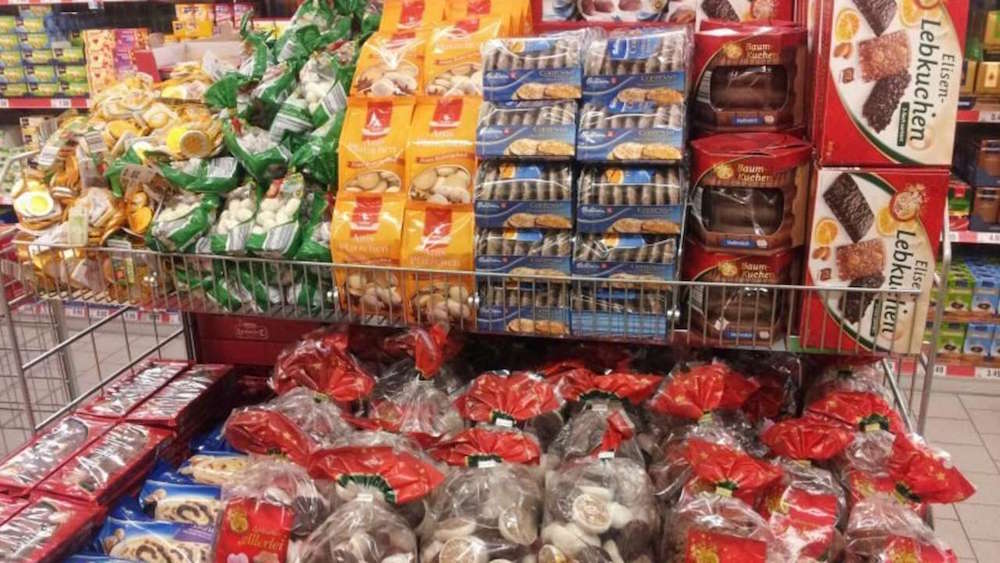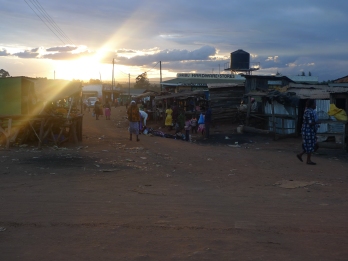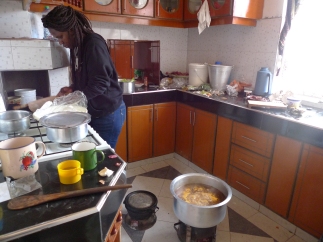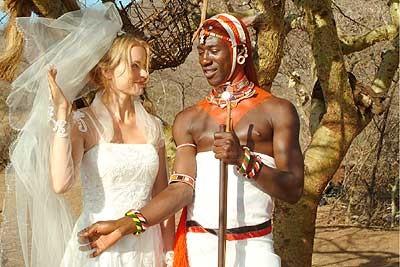
When I was invited to spend Christmas with a Kenyan family, I already suspected it would be quite different from the holiday I know and love in Germany. But how different was it really?
Let me start with a little introduction to the Asan family’s Christmas traditions. The main celebration in Germany is on Christmas Eve, and the main happening is usually the exchange of presents. It’s really more of a capitalist holiday than it is a religious one. But it’s also about spending time with your loved ones, which in our case means our nuclear family of five.

On the morning of the 24th, we go out and buy the smallest, most misshapen tree we can find. Who else would take pity on the poor little thing? We take it home and decorate it nicely. Everything is pretty and shiny, mom already put up the decorations around the house in early December.
We take a walk, prepare some very early dinner, and are finally let loose on the presents that have been waiting underneath the tree all day. The rest of the evening, we spend munching on cookies, chocolates and mandarines that my mom has lovingly arranged on plates for each of us, and we watch some movie (like Inglorious Basterds, for example).
What’s so different about Kenyan Christmas, you ask? Since list articles are all the rage these days, I figured I’d make one for you. So here we go:
10 ways in which my Kenyan Christmas was different from my German ones
#1: The weather
This is an obvious one. December 22nd marks the beginning of winter in Germany. When I was a child, that usually meant a white Christmas. We haven’t had a whole lot of those in recent years, one of the early-onset effects of global warming. This year, most of the country saw temperatures in the double digits (Celsius). Still not quite the cozy, sunny warmth of Kitale, though.
#2: The family
By that, I don’t mean that I was with a different family this year (duh!), but rather that the word ‘family’ is understood much more broadly here in Kenya. Everyone is going home for the holidays, and that usually means gathering a whole bunch of people in their native rural area. We’re talking cousins, in-laws, and that one guy who just showed up for the food and claims to be some extended relative.
#3: The surroundings
Germany is a country with a 75 percent urban population, so most people will spend the holidays in a medium sized town. In Kenya, that number is closer to 25 percent, and even city dwellers usually have family on the countryside. In our case, we spent the holidays on a beautiful compound about 20 minutes away from Kitale town with a huge garden, farm animals and a very green vista. Between that or a Christmas market right in front of our doorstep in my German hometown, both options are idyllic in their own right.

#4: The food
Of course, Kenyan cuisine in general is very different from the German one, and Christmas is no exception. Instead of a full, big breakfast, we had sweet milk tea and mandazis, a simple sort of fried doughnut. Instead of a goose, we had a whole sheep over the course of several days: meat, innards and all, in a stew, fried, and on the grill. And instead of sweets on Christmas Eve, we had booze.

#5: The evening activities
Christmas Eve in Germany is perfect for snuggling up around a fireplace, or its modern day version, the TV set. In Kitale, it was party time. We had some nyama choma, Kenyan style barbecue (mutton, obviously). Afterwards, we chatted around the bonfire for a while and then had a blast dancing at the club for a few hours.
#6: The presents
In short: There were none.
#7: The division of labour
I am not going to claim that the workload in our family’s household is evenly distributed. My mom takes care of all the decorations, keeping the house nice and tidy, and she does most of the shopping. But at least everyone offers a helping hand when it comes to things like cooking and cleaning. This year, my dad was the one preparing the dinner. This is hardly imaginable in Kenya, where all the heavy load is shouldered by the women. So while my friend Ruth was basically cooking and cleaning from dawn till dusk, the guys were mostly sitting around and watching cartoons, or out on the town meeting their friends.

#8: The planning
You know Germans love to make plans and stick to them, and our German-Turkish family is not so different. We usually layout a rough schedule for Christmas Eve together, just so everyone knows what to expect. Like at what time dinner will be served, if we’ll open the presents before or after that, and what everyone’s up to in the evening. In Kenya, even if you make plans, you can be pretty sure that they will be thrown out of the window at some point. It works just as well, it’s just a very different, more flexible approach.
#9: The privacy
Let’s face it: We all love our families, but when we spend a lot of time with them, we sometimes want to punch something. So we go to our room, close the door, take a breather. That can be difficult in a crowded Kenyan house with the whole family around. I did get the luxury of my own room (I think I was the only one in the house, much appreciated!), and from time to time I would retreat to take a little nap or check my messages. Knocking before entering, however, was optional, and I was woken up more than once by a child jumping onto my bed. Whatever, they were so cute, who could be mad at them!
#10: The getaway
While we usually visit my grandparents right after Christmas, this year I went on a different sort of outing: a wonderful trip to Mount Elgon.
Courtesy: My Big Fat Kenyan Christmas








